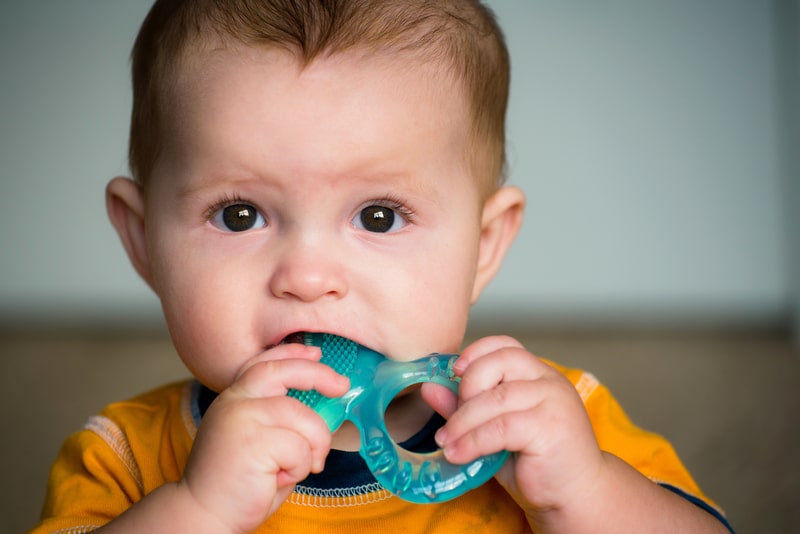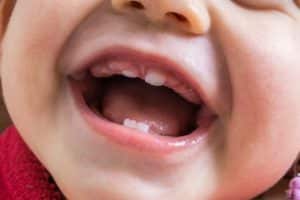Child and Infant Oral Care


Did you know that your infant should start seeing a dentist within the first 6 months of their first tooth showing? Infants will get their teeth slowly, and they will have those teeth for up to a decade. Those 20 baby teeth are small and delicate, and must receive extensive care or they can easily decay. Good infant oral care will turn into childhood hygiene habits that your child will have when they are an adult. Do you know what proper child and infant oral care habits your little one needs to keep their smile healthy? We can help you know!
Infant Oral Care: When to Start
Many people know the importance of brushing and flossing their teeth. However, despite this knowledge, cavities are incredibly prevalent. In fact, the National Institutes of Health reports that tooth decay (which is cavities) is the most prevalent chronic disease among children and adults. When you think of tooth decay as a disease, it becomes something even more important to try to avoid. Many people don’t know how to properly care for their teeth or when they need to be brushing and flossing. When it comes to infants, new parents don’t always know when to start.
When your child gets their first tooth (even if it is still just pushing through the gums, you must start on infant oral care practices. Brush that delicate first tooth after each meal or bottle of milk. When the baby does drink milk, make sure to use a wet cloth and clean the baby’s gums. Milk is full of sugars (breast milk has even more than formula), and that sugar goes to work immediate to decay a tooth. Don’t wait until your child has several teeth in their mouth to start on an infant oral care routine. Watch your baby’s gums for that first little tooth to pop through and then care for it meticulously once it’s emerged. To get you even better prepared, you can start early on cleaning your baby’s gums with a damp cloth if you want. Their gums can’t get tooth decay, but it never hurts to start the habit early-on.

Baby and Child Teeth
Your baby will have teeth come into their mouth one at a time. This can happen as early as 3 months or your baby could be 2 years old when they get their teeth. For most children, they will start having teeth erupt between 4 and 9 months old. The bottom two teeth will come in first, followed by the upper 2 teeth. They will eventually have 20 teeth in their mouth. It’s very important to practice infant oral care because those baby teeth will stay with your child for several years. They will begin to fall out around age 7 or 8 (sometimes earlier) to start making way for the permanent, adult teeth. However, baby teeth are very delicate and can decay fast, so you always want to brush and floss their tiny teeth and teach them how to do it themselves once they are old enough.
Child Oral Care
You will have to help brush and floss your child’s teeth for several years. For infants, brush their teeth (or tooth) at least twice a day and clean their gums with a damp cloth after feedings. Brush gently on the baby teeth and the gums. You can even gently brush their tongue to remove food and bacteria that cause bad breath and decay. Use an infant brush for your infant oral care and upgrade to different child toothbrushes as they grow. Some of these child toothbrushes will have easy-hold grips and fun shapes for children. The toothbrush heads will also be smaller than adult toothbrushes to fit the size of your child’s mouth.
You want to always make sure you do get them a child’s brush, as having a toothbrush that is sized for their mouth will help make sure that brushing is effective. These toothbrushes are generally softer than adult ones as well, making brushing more enjoyable. Children may not need to floss as much when they have a few teeth, but if the teeth fit more snug together or if your infant starts to get many teeth, then flossing should be integrated into the infant oral care routine. To reduce your child’s risk for tooth decay even more, you can use a fluoride toothpaste that is safe for children. You only use a grain-of-rice size of toothpaste for a toddler, and then upgrade to a pea-size amount when your child is about 3 or 4 years old.

See the Dentist
We mentioned the importance of having an infant oral care routine. Once that first tooth is there, your child should have an oral hygiene routine forever after if they want to keep their teeth. Your participation in vital in helping them avoid tooth decay. Make a schedule throughout the day to brush your child’s teeth, especially if you have multiple children so you don’t forget. Lastly, seeing the dentist is incredibly important for your child’s oral health. A dentist can spot the signs of early decay and can help you with your infant oral care. At our office, we can even give you instructions for helping your child have a healthy mouth. Children should come visit us at least twice a year, just as an adult would. An infant should see the dentist within the first 6 months of getting their first baby tooth. If you need to schedule your child’s dental visit or your own, call Dr. Ania’s office today at 303-443-0998!


